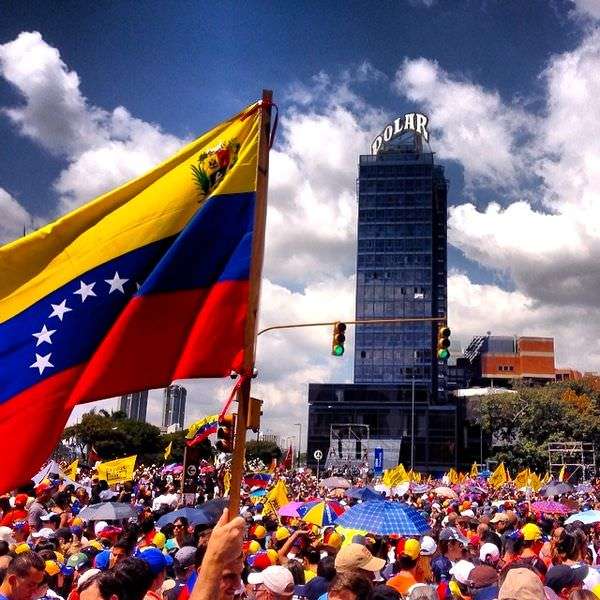Venezuelans Organize Protests and Evade State Censorship With Walkie-Talkie App

Like with Arab Spring, protesters in Venezuela and Ukraine owe their impressive organization to mobile social media apps. Venezuelan authorities are particularly frustrated with Texas-based Zello, a simple walkie-talkie app, for emerging as a leading tool for the opposition. The government even tried to block it.
The peer-to-peer digital messaging app spread like wildfire to 600,000 Venezuelans last week after success in organizing Ukrainian protests. Business Insider reports that it has "helped to mobilize marches, evade security sweeps, and build barricades."
The push-to-talk method allows users to communicate by pressing a button and broadcasting to a group. The tool's openness is a tremendously popular feature (even if the government can listen in). Groups can range from two to hundreds of thousands, although only 600 can access a group at any given time. Additionally, Business Insider explains:
Part of the appeal of Zello is the ability of the human voice to carry so much more information than mere type, allowing users to give impassioned speeches.
Zello can be used to circumvent state censorship. The app was popularized during Turkish demonstrations last year to sidestep state-imposed roadblocks. Similarly, Venezuelan authorities have suppressed speech in sporadic doses: it blocked picture and video uploads to Twitter temporarily, blacked out Internet in the capital city for about 30 hours, and removed neighboring Columbia NTN24 station from cable. There is virtually no media coverage of the demonstrations in the state.
The government even tried to stamp out Zello through the publicly-owned telecommunications company CANTV. But it hardly left a scratch. The company re-released a functional version in under 24 hours.
Venezuelans are revolting for a variety of reasons, but unaccountable government is a major motivation. Ed Krayewski of Reason explains, "Maduro acted as if his government had a mandate to do whatever it wanted, in the name of the people. Enough people have now had enough intrusive government to push back."
Social networks like Zello allow repressed citizens to retrieve information and organize against unpopular measures or corrupt behavior. The mix of digitally-situated free speech, protests fueled by repression, and government censorship, seem to constitute a formula in recent anti-government revolts, a feedback loop that could inch nations toward transparency and improved governance. The other day Google executive chairmen Eric Schmidt made a daring prediction on CBS. Because of the Internet, state censorship "will be effectively impossible," he said. Perhaps "within a decade."
Read more from Reason.com on Venezuela here.
Editor's Note: As of February 29, 2024, commenting privileges on reason.com posts are limited to Reason Plus subscribers. Past commenters are grandfathered in for a temporary period. Subscribe here to preserve your ability to comment. Your Reason Plus subscription also gives you an ad-free version of reason.com, along with full access to the digital edition and archives of Reason magazine. We request that comments be civil and on-topic. We do not moderate or assume any responsibility for comments, which are owned by the readers who post them. Comments do not represent the views of reason.com or Reason Foundation. We reserve the right to delete any comment and ban commenters for any reason at any time. Comments may only be edited within 5 minutes of posting. Report abuses.
Please to post comments


frustrated with Texas-based Zello
Aside: Has anyone noticed how company/corporate names go through trends with different generations?
Back in my day, companies were named like, oh, I dunno, Genicom, Technigen, Virtuacom, Lucent, WorldCom... that kind of thing.
Now? It's all Winga and Zinga, and Ingy, Zillo, Wedgie, Loogie... goddamned whippersnappers.
What will leftists do when they can no longer control the message or means of communication?
Go home with their tails between their legs? Oh, ha! Sorry, I meant they'll just start killing anyone carrying a cell phone or other electronic device.
Your answer is buried in here: The government even tried to stamp out Zello through the publicly-owned telecommunications company CANTV
Something involving Net Neutrality where the government has it's grubby paws in how every ISP designs its network, and something involing an 'OFF' switch.
it's = its.